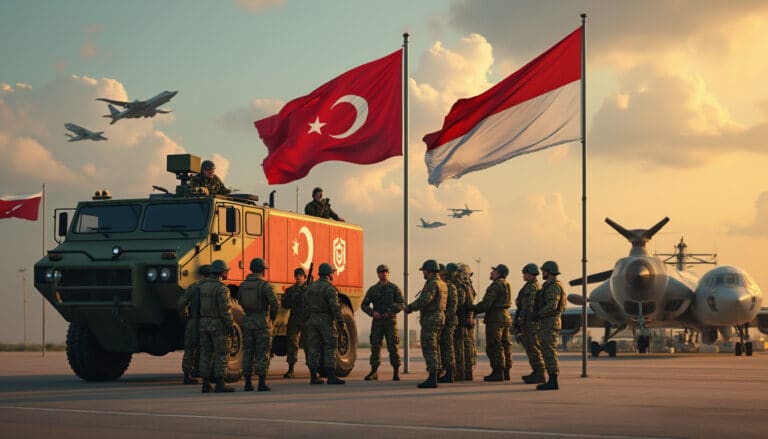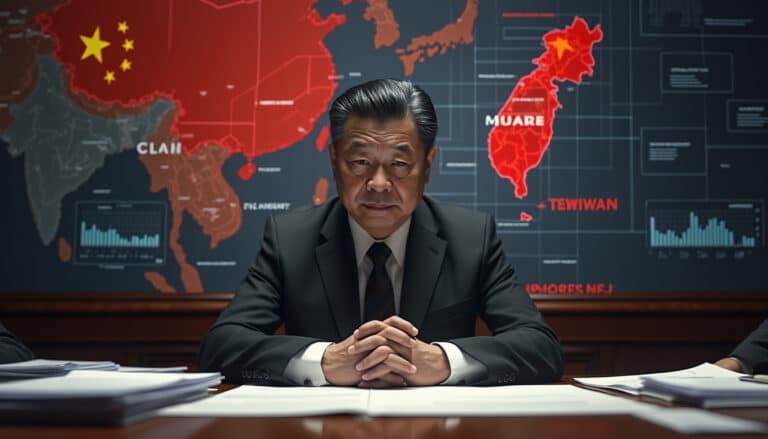A dark day marked the SAHA EXPO 2024 in Istanbul. Attackers targeted the headquarters of Turkish Aerospace Industries, causing panic and chaos. Four people lost their lives and fourteen others were injured during this terrorist attack.
The international community reacted with shock to this tragic event. Turkish authorities immediately reinforced security around the exhibition, hosting the largest defense fair in the country. The identity of the attackers and the origin of the assault remain unknown, although several hypotheses are being considered. Turkish leaders have firmly condemned this aggression, emphasizing the resilience of the national defense industry.
Security forces quickly secured the area, with the addition of several police cars in front of the nearby Turkish Airlines flight training center. Emergency services and medical teams were deployed to the scene to assist the injured. Identifying the attackers remains a priority for the authorities, who are exploring different hypotheses regarding the motivations behind this act of violence. Among the potential suspects are Kurdish militants, the Islamic State, or leftist extremists, who have already claimed similar attacks in the country.

The SAHA EXPO 2024, recognized as the largest defense exhibition in Turkey, was the scene of a tragic event that deeply shook the defense sector and national security. During the second day of the exhibition, a terrorist attack targeted the premises of Turkish Aerospace Industries (TAI) in Kahramankazan, near Ankara, resulting in the deaths of four people and leaving 14 injured. This incident occurs in a context of heightened geopolitical tensions and raises crucial questions about the security of large-scale events.
Table des matières
ToggleWhat are the circumstances of the attack and its immediate consequences?
The attack occurred on Wednesday, October 23, 2024, in the afternoon, as visitors flocked in to discover the latest innovations in defense. According to Turkish Interior Minister Ali Yerlikaya, the attackers used explosives and firearms to breach the headquarters of TAI. The Turkish security forces quickly intervened, leading to the hasty evacuation of several government and industry officials.
Initial reports indicate that the attackers, including a woman, arrived by taxi at the complex before detonating an explosive device near their vehicle, causing panic and facilitating their entry into the compound. Nearby sirens alerted emergency services, but the swift intervention of security forces helped limit the damage and prevent an even worse catastrophe. Despite this, four people lost their lives, and 14 others were injured, several of whom seriously.
This attack not only caused human losses but also resulted in a partial interruption of the SAHA EXPO 2024. Although organizers initially considered continuing the event, some parts were subsequently canceled, highlighting the vulnerability of large gatherings in the face of terrorist threats.
What is the impact of this attack on the SAHA EXPO 2024 and the Turkish defense industry?
The attack had immediate repercussions on the course of SAHA EXPO 2024. Indeed, participants and exhibitors found themselves in an emergency situation, affecting morale and confidence in the security of the event. The general manager of TAI, Mehmet Demiroglu, was forced to leave the exhibition hastily to head to Ankara, underscoring the gravity of the situation.
From the perspective of the defense industry, this attack represents a significant threat. TAI is a key player in the development and manufacturing of advanced defense technologies, including the Bayraktar Kizilelma drones, which have played a crucial role in anti-terror operations in Turkey and Iraq. The attack could potentially hinder the initiatives for the development and deployment of these technologies, thereby impacting Turkey’s strategic position in the defense field.
Moreover, this incident could deter investors and international partners from participating in future defense fairs in Turkey due to concerns over insufficient security measures. The local economy and defense sector businesses may also suffer financial losses due to the cancellation of certain parts of the exhibition and reduced commercial activity.
What have been the reactions from Turkish authorities and the international community?
Turkish President Recep Tayyip Erdogan firmly condemned the attack, labeling it a “horrible terrorist act”. During a meeting with Russian President Vladimir Putin at a BRICS summit in Kazan, Erdogan expressed his wish for the victims to receive divine mercy. These words were widely reported by national and international media, reinforcing Turkey’s determination to combat terrorism.
Turkish authorities promptly launched a thorough investigation to determine the perpetrators of this attack. While the exact motive remains unclear, several terrorist groups such as Kurdish militants, the Islamic State, and leftist extremists have been suggested as potential authors. The complexity of the investigation is heightened by images released showing a civilian carrying an assault weapon, making the identification of the attackers more difficult.
Internationally, this attack has elicited reactions of solidarity and concern. Many countries have expressed their support for Turkey, strengthening ties in terms of security and defense. International security experts have also called for reinforced cooperation to prevent such attacks in the future.
How does this attack influence Turkey’s national security strategy?
In the aftermath of this incident, the Turkish government has reviewed and strengthened its security measures, particularly in public places and large-scale events like SAHA EXPO. There is now an emphasis on increased surveillance, better coordination among security forces, and the use of advanced technologies to detect and neutralize potential threats more effectively.
Furthermore, this attack has highlighted the need for effective crisis management. Becoming an expert in crisis management is now more crucial than ever, with a growing demand for professionals capable of responding quickly and effectively to emergencies. Turkey may consider enhancing its training and capabilities in this field to better prepare for future threats.
Additionally, the incident has underscored the importance of cybersecurity in the defense sector. The integration of robust cybersecurity systems has become a priority to protect not only physical infrastructures but also sensitive data against sophisticated cyberattacks. An overview of future expectations for cyberspace in combat indicates a trend towards increased automation and artificial intelligence to anticipate and counter threats before they become unmanageable.
What are the long-term repercussions for Turkey’s defense industry?
The attack on TAI could have lasting repercussions on the Turkish defense industry. On one hand, it could prompt companies to invest more in advanced security measures, thereby increasing operational costs. On the other hand, this situation could accelerate innovation in the defense field, pushing companies to develop safer and more resilient technologies against terrorist attacks.
A crucial aspect is the resilience of supply chains and the capacity of companies to maintain their operations despite threats. Turkish defense companies may need to diversify their partnerships and enhance their logistical capabilities to minimize the future impacts of similar attacks. Furthermore, the incident could stimulate research and development in areas such as defense drones, artificial intelligence, and robotics. Becoming a defense robotics engineer thus becomes a promising career path for those looking to contribute to national security.
This attack could also influence Turkey’s defense policy in terms of international collaborations. Turkey may strengthen its alliances with countries sharing similar security concerns, thereby fostering joint initiatives to combat terrorism and promote a more integrated and secure defense industry.
What lessons can be learned from this incident to prevent future attacks?
The attack against TAI at SAHA EXPO 2024 offers several essential lessons for the prevention of future similar incidents. First, the importance of a holistic approach to security is evident. It is not enough to focus solely on the physical protection of sites; it is also crucial to integrate cybersecurity and data management strategies to counter multidimensional threats.
Next, coordination among different security agencies must be improved. Effective communication and rapid response are vital to minimizing damage in the event of an attack. Investing in continuous training for law enforcement and security personnel is also essential to ensure adequate preparedness against evolving threats.
Moreover, public awareness and training for event participants are crucial. Educational programs on behaviors to adopt in emergencies can save lives and reduce panic during incidents. Additionally, the use of advanced technologies such as artificial intelligence for monitoring and early detection of threats can significantly enhance prevention capabilities.
Finally, it is essential to strengthen the resilience of critical infrastructures. This includes diversifying supply sources, securing supply chains, and establishing business continuity plans to ensure operations can continue despite security incidents.
By learning from this attack, Turkey can not only improve its own national security but also contribute to global security by sharing its experiences and strategies with other nations facing similar challenges.
What are the upcoming developments for SAHA EXPO and security in Turkey?
Following the attack, the organizers of SAHA EXPO 2024 indicated that they would implement enhanced measures to ensure the safety of participants during the coming days of the event. Efforts are underway to reevaluate security protocols and integrate cutting-edge technologies to prevent any future attempts of intrusion or attack.
Furthermore, the Turkish defense industry continues to position itself as a major player on the international stage. Despite recent challenges, Turkish companies like TAI are pursuing their development and manufacturing initiatives for advanced technologies, particularly in the field of drones and space systems. Current incidents reinforce the need for heightened vigilance and continuous adaptation of defense strategies to remain effective against emerging threats.
Additionally, the Turkish government is likely to strengthen its international collaborations in the field of security and defense. Partnerships with other nations and international organizations could be intensified to share information, technologies, and best practices, thereby contributing to a more robust collective defense.
Finally, the defense sector in Turkey could see an increase in investments in research and development aimed at creating innovative solutions to counter current and future challenges. The focus on defense robotics, cybersecurity, and crisis management will represent key areas for the evolution of the industry, ensuring a more effective and proactive response to potential threats.
In conclusion, while the attack had immediate negative consequences, it also presents an opportunity to reassess and strengthen security measures, stimulate innovation, and promote enhanced international collaboration in defense and security.
#>
























